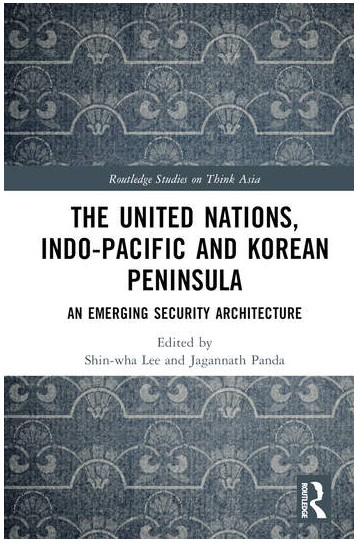KACUNS 학술회의_영문 Activities
Conferences
|
Routledge Publication: Shin-wha Lee and Jagannath Panda eds. The United Nations, Indo-Pacific and Korean Peninsula: An Emerging Security Architecture (Routledge, 2023) 2023-10-04 645 |

The Korea Academic Council on the United Nations System (KACUNS) recently published The United Nations, Indo-Pacific and Korean Peninsula: An Emerging Security Architecture (Routledge, 2023) in August, 2023. The book project reflected the vision of KACUNS to not only promote research on the impact of the UN system on regional and global peace but also educate the international audience on the importance of multilateral diplomacy through the UN. Moreover, the project was the culmination of thoughtful interactions among UN experts from around the world and of different generations. The direction and theme of the book were shaped through numerous meetings beginning with the kick-off meeting held in July 2021. The contents of the book were finalized after receiving feedback from experts who commented on the chapters during the 2021 KACUNS Annual Summer Conference (August 2021) and the United Nations, Indo-Pacific, and Korean Peninsula online workshop (December 2021), both hosted by KACUNS. The United Nations, Indo-Pacific and Korean Peninsula focuses on the United Nations (UN) and its frameworks to examine the power politics in two of the world’s more politically sensitive and geo-strategically crucial regions of the Korean Peninsula and the Indo-Pacific. This book provides answers to broader questions that are relevant to the global emerging peace architecture. The book is divided into three parts: global, the Indo-Pacific, and the Korean Peninsula. The first part analyses the competing world views of the US, China, Japan, and Korea and the evolvement of UN debates on global and regional security, with special emphasis on the Indo-Pacific and the Korean Peninsula. The second part concerns major bilateral or multilateral security issues facing Indo-Pacific countries and their UN debates in this regard. In particular, with new developments in the Indo-Pacific, such as the Quad process involving the Australia-India-Japan-United States and an anticipation expansion of the Group of Seven (G-7), chapters analyze how these mechanisms expand their focus within the scope of Indo-Pacific power politics. Part three focuses on the UN-centered debates on the two Koreas and their strategic fallouts at regional and global levels. KACUNS would like to thank all authors who contributed to this edited volume. In particular, KACUNS expresses sincere gratitude to Dr. Shin-wha Lee (Professor, Department of Political Science and International Relations, Korea University / 8th President of KACUNS) and Dr. Jagannath Panda (Head of the Stockholm Center for South Asian and Indo-Pacific Affairs (SCSA-IPA), Institute for Security and Development Policy(ISDP)) for co-editing the book, as well as Dr. Jae Jeok Park (Professor, Graduate School of International Studies, Yonsei University / Korea-China-Japan Cooperation Division Director of KACUNS) for organizing and shepherding the project to its completion. ======================================================================== [Table of Contents] Introduction: Can the Declining Relevance of the UN be Reinvigorated? Factoring the Indo-Pacific and Korean Peninsula by Shin-wha Lee and Jagannath Panda Part-I: The UN and Competing Worldviews 1. US-China Strategic Competition in UN Multilateral Frameworks: Building Order or Inviting Conflict? by Jae Jeok Park and Shin-wha Lee 2. The United Nations in Korea: US Views of Once and Future Roles by Mark Tokola 3. Legitimacy, Power and Order-Building in the Indo-Pacific: China, the UN, and Managing the North Korean Nuclear Challenge by Jindong Yuan 4. Role of the United Nations in Japanese Foreign Policy and Security Architecture by Kristi Govella 5. The United Nations, Korean Foreign Policy and the Korean Peninsula, by Heung Soon Park Part-II: The UN and the Indo-Pacific Security Architecture 6. China, UNCLOS and the Future of International Maritime Law in the South China Sea by Jeffrey Becker 7. Opportunities for Consensus, Collaboration and Recalibration: UN and the Quad by Jagannath Panda 8. Does Humanitarian Aid Save Civilian Lives in War? The Case of UN Aid in Myanmar’s Civil War by Hyun Jin Choi and Taekyoon Kim 9. The United Nations and the Curious Case of Sino-Indian Boundary Dispute by Priyanka Pandit Part-III: The UN, its Frameworks and Korean Peninsula 10. Northeast Asian Peace Architecture and the UN by Matthew Abbott 11. Change in the Security Environment and Transformation of the United Nations Command by Hanbyeol Sohn and Hanbeom Jeong 12. The Past, Present and Future of SDGs Discussion on the Korean Peninsula: SDGs as a Framework for New Cooperation by Kyungyon Moon and Dong-ju Choi 13. A Case Study on the Success and Failure of Weapons of Mass Destruction Nonproliferation Regimes: Focus on Chemical Weapons and Biological Weapons Conventions by Ki-Chul Park and Jaewoo Choo 14. Improving State Reputation through the UN: The Case of North Korea by DongJoon Park and Kyung-joo Jeon |
|
Attachments
|











